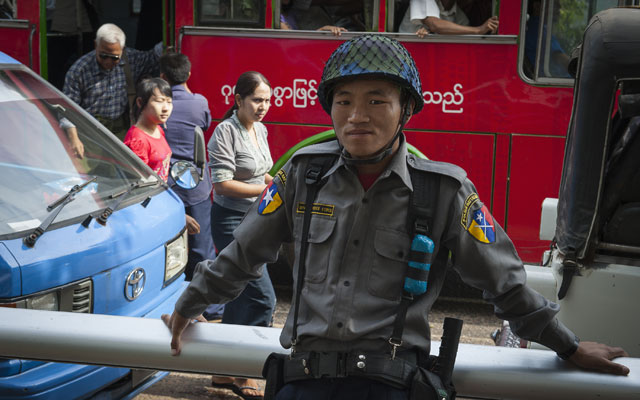Hill Concern over U.S.–Burma Military Engagement Grows
Walter Lohman /
First, the House of Representatives moved to draw a line on American engagement with the Burmese military. Now, the Senate is beginning to stir.
The National Defense Authorization Act (NDAA) that passed the House a couple of weeks ago contains language expressing the sense of Congress that “the Department of Defense should fully consider and assess the Burmese military efforts to implement reforms, end impunity for human rights abuses, and increase transparency and accountability before expanding military-to-military cooperation beyond initial dialogue and isolated engagements.”
The committee report that accompanies the bill contains a requirement that the Department of Defense “thoroughly evaluate the potential for developing military to military relations” and brief the committee on its findings before September 30 of this year. Those findings will be classified, but based on proposals being kicked around during the committee’s consideration of the bill, they will likely include assessments of the following:
- To what extent these engagements further U.S. security interests,
- To what extent these engagements further U.S. interests in promoting human rights in Burma,
- To what extent the Burmese military has been helpful in the investigation and resolution of human rights violations committed by its forces,
- The level of transparency regarding the military’s budget and operations, and
- The level of progress that has been made in the divestiture of the military from commercial businesses.
The Senate has also taken an interest. In reporting out its own version of the 2014 authorization bill last week, the Senate Armed Services Committee took note of “modest and measured military-to-military interactions with the Burmese military.” While it also noted that “such military engagement activities can be positive reinforcement for meaningful reforms,” it stressed the committee’s concern for the “history of human rights abuses within the Burmese military, concerns regarding continuing abuses, and the possibility that any well-intended U.S. military engagement could be misdirected toward a negative result.”
Accordingly, like the House, the Senate committee report also directs the Secretary of Defense (in coordination with the Secretary of State), to report back to Congress. The Senate report specifically calls for written updates on the status on U.S.–Burma military-to-military engagement, including “the status of the Burmese military’s cooperation with civilian authorities to investigate and resolve cases of military human rights violations.”
There’s nothing earth-shattering here. The committee’s Ranking Member, Senator Jim Inhofe (R–OK), was an earlier mover on lifting Burma sanctions. The action in the House and Senate is a simple matter of accountability, both for Burma’s reform effort and the Administration’s policy. The former stalwarts of human rights in Burma on the Hill appear comfortable with an informal, “trust me” accountability. No one doubts the trustworthiness of the likes of Senators Mitch McConnell (R–KY) and Dianne Feinstein (D–CA). But that’s not enough: Accountability must be public and formal. In the House, Representative Trent Franks (R–AZ) is leading the charge in this regard. In the Senate, Senator Inhofe’s committee is taking the lead. Neither chamber is likely finished. As the annual appropriations bills make their way through the process, further action on the issue is likely, particularly on the State and Foreign Operations appropriations bill, where critical funding for the Administration’s outreach to the Burmese military resides.
The bottom line: The Administration has overextended itself on Burma. Not content with having lifted, suspended, or eased virtually all economic sanctions against Burma over the past 18 months in an effort to support the “good guys,” the Administration is now moving to lend a brutal military the prestige of cooperation with the finest fighting force the world has ever seen. This is a personal conclusion, not necessarily that of the Senate and House Armed Services Committees. But the prospect of closer military relations with Burma has at least been enough to make Congress start asking the difficult questions and require formal answers.

